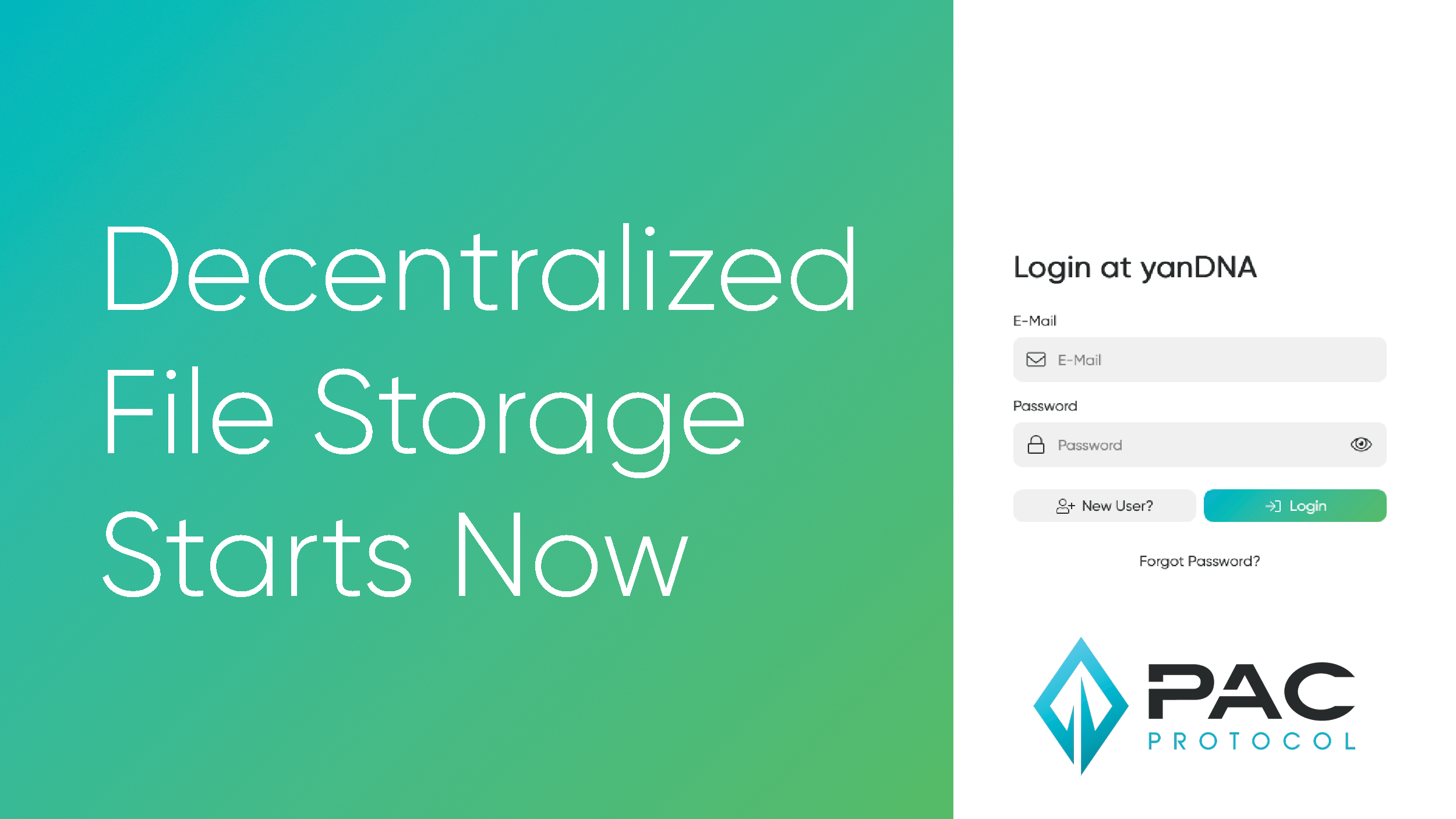PAC Protocol Announces the Official Release of yanDNA™- Beta Version


Cheyenne, Wyoming (September 30, 2021) - - PAC Protocol, the largest data blockchain network focused on decentralized storage, is pleased to announce the official release of its yanDNA™ product – beta version. yanDNA™ is a decentralized storage product that incorporates IPFS technology and will be available both to consumer and enterprise users when the full version product is released. One key feature of our product is the ability to split a single data file across hundreds or even thousands of computers fully encrypted. This makes it extremely difficult to reassemble this file by a bad actor and steal your data as compared to a centralized network with data housed in a single location.
Additional product features – beta version:
Seamlessly download / upload files.
File splitting across multiple computers attached to the network.
Both light and dark interface modes available.
Comprehensive search feature.
Preview file images – data and video.
All files stored on the blockchain.
Future product features expected on the full version of yanDNA™:
YAN token as a way for the PAC community to monetize and earn while providing storage.
Internal file sharing with other yanDNA™ members.
3D rendering along with PDF previews.
API implementation for third party developers to use.
Additional features to be announced.
Management believes that there are number of compelling use cases for decentralized storage throughout the blockchain industry and beyond. There is the potential for PAC Protocol to act as the “backend” network provider to existing platforms. For example, the NFT (Non-fungible token) marketplace is receiving a lot of attention and there is an inherent need to safely store, manage, and distribute these digital assets. PAC feels strongly that they can successfully store and manage the entire NFT backend process. Additional industries where yanDNA™ could be a fit include healthcare, online gaming, legal, and other vertical blockchain platforms – all “Powered by PAC Protocol”.
IPFS – IPFS, or Interplanetary File System, was created by Protocol Labs in 2015. It works by connecting devices with the same system of files through a network of nodes. Data stored on an IPFS network are given a unique content hash which then can be stored on the blockchain. It asks the entire network who has data associated with that hash and gathers pieces of the files from multiple computers simultaneously. Comparing IPFS to HTTP (which powers today’s Internet), files can be accessed, altered, or erased by whoever has access to the server in HTTP. There is typically no single point of failure in IPFS while HTTP is great for downloading websites but wasn’t designed to send large audio or video files. IPFS seeks to create a permanent and distributed web by using a content-addressed system vs. HTTP’s location-based system.
“We are extremely excited to launch our beta version of yanDNA™,” stated Drew Saunders, Chairman of PAC Protocol. “I believe that the advantages of decentralized storage will be realized by our community along with our growing list of strategic partners. The PAC Protocol team has worked tirelessly to deliver a world-class product and thanks goes out to all of our outstanding team members who made this happen.”
David Gokhshtein, CEO of PAC Protocol, added: “I would like to commend Drew and the extraordinary PAC development team for many long days and nights in developing our truly unique product yanDNA™. The ability to store crucial data on the blockchain in a decentralized format has many distinct advantages vs. centralized networks in my opinion. It seems that not a day goes by where user data is compromised and our hope is that yanDNA™ can alleviate some of this in the marketplace.”
yanDNA.io
About PAC Protocol PAC Protocol (PAC),
based in the US, is focused exclusively on providing next generation blockchain network solutions to solve real world problems. It is currently the largest truly decentralized master node network in the world focused on data storage and its network has points of presence in nearly 30 countries. Our network is based on the energy efficient Proof of Stake (PoS) algorithm which greatly reduces our overall carbon footprint. For more information about PAC Protocol or if you are interested in partnering with us on decentralized storage please contact David Gokhshtein, CEO at [email protected], visit us at @PACcoinOfficial, or our website at www.pacglobal.io.
Forward-Looking Statements
This press release may include ''forward-looking statements.'' To the extent that the information presented in this press release discusses financial projections, information, or expectations about our business plans, results of operations, products or markets, or otherwise makes statements about future events, such statements are forward-looking. Such forward-looking statements can be identified by the use of words such as ''should,'' ''may,'' ''intends,'' ''anticipates,'' ''believes,'' ''estimates,'' ''projects,'' ''forecasts,'' ''expects,'' ''plans,'' and ''proposes.'' Although we believe that the expectations reflected in these forward-looking statements are based on reasonable assumptions, there are a number of risks and uncertainties that could cause actual results to differ materially from such forward-looking statements. You are urged to carefully review and consider any cautionary statements and other disclosures that PAC Protocol may file from time to time. Forward-looking statements speak only as of the date of the document in which they are contained, and PAC Protocol does not undertake any duty to update any forward-looking statements except as may be required by law.
Website: https://pacprotocol.com
Coinmarketcap: https://coinmarketcap.com/currencies/pac-protocol/
CoinGecko: https://www.coingecko.com/en/coins/pac-protocol
Twitter: https://twitter.com/PACcoinOfficial
Instagram: https://www.instagram.com/pacprotocol
Facebook: https://www.facebook.com/PACProtocol/
LinkedIn: https://www.linkedin.com/company/pac-global-llc
TikTok: https://www.tiktok.com/@pacprotocol